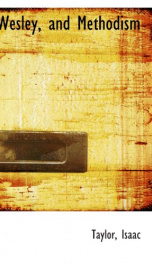wesley and methodism

Purchase of this book includes free trial access to www.million-books.com where you can read more than a million books for free. This is an OCR edition with typos. Excerpt from book: between the Wesleyan and the Whitefieldite Methodism; and it is curious to note the fact, that while, as we shall see, the former exhibited at its commencement ostensible extravagances and distortions which in a much less degree attached to the latter, it was Wesley's community that crystalized itself in geometric figure; while Whitefield's followers passed into an organized condition very slowly and very imperfectly. Wesley's Methodism excelled in external order; Whitefield's in a deep and more true harmony. But what we have just now to do with is, that training in verbal precision, which was to give life and form, both to the theology of Wesley, and to his institutions. EARLY STAGES OF WESLEY'S RELIGIOUS COURSE. At Oxford, Wesley's religious feelings went through a two-fold transmutation, which, however, brought him very little way forward toward the position whence he was to exercise his ministry. At each step of his progress he had yielded, after some resistance, to a force partly logical, and partly suasive ; and his so yielding might, by a bystander, have been anticipated as certain to ensue. Nevertheless, his conversion, taking place as it did in this manner, by successive vanquishments, gave to his own religious opinions, and so afterward to Methodism, a marked character of abruptness and antagonism. The conversion of several of his companions was less, or not at all, interrupted by distinct epochs: and therefore, while it was less logical, it was of a more even color, and the doctrinal system adopted had in it more of harmony, and less of paradox. Wesleyan Methodism, so far as it was the product of its founder's mind, and the representative of his individual experience, and the symbolic record of his personal religious history, came fortha cramped Christianity; ...
Info about the book
Author:
Series:
Unknown
ISBN:
1425534139
Rating:
3.5/5 (2)Your rating:
0/5
Languge:
English
Users who have this book
Users who want this book
What readers are saying
What do you think? Write your own comment on this book!
write a commentif you like wesley and methodism try:
Other books by this author
Do you want to read a book that interests you? It’s EASY!
Create an account and send a request for reading to other users on the Webpage of the book!


